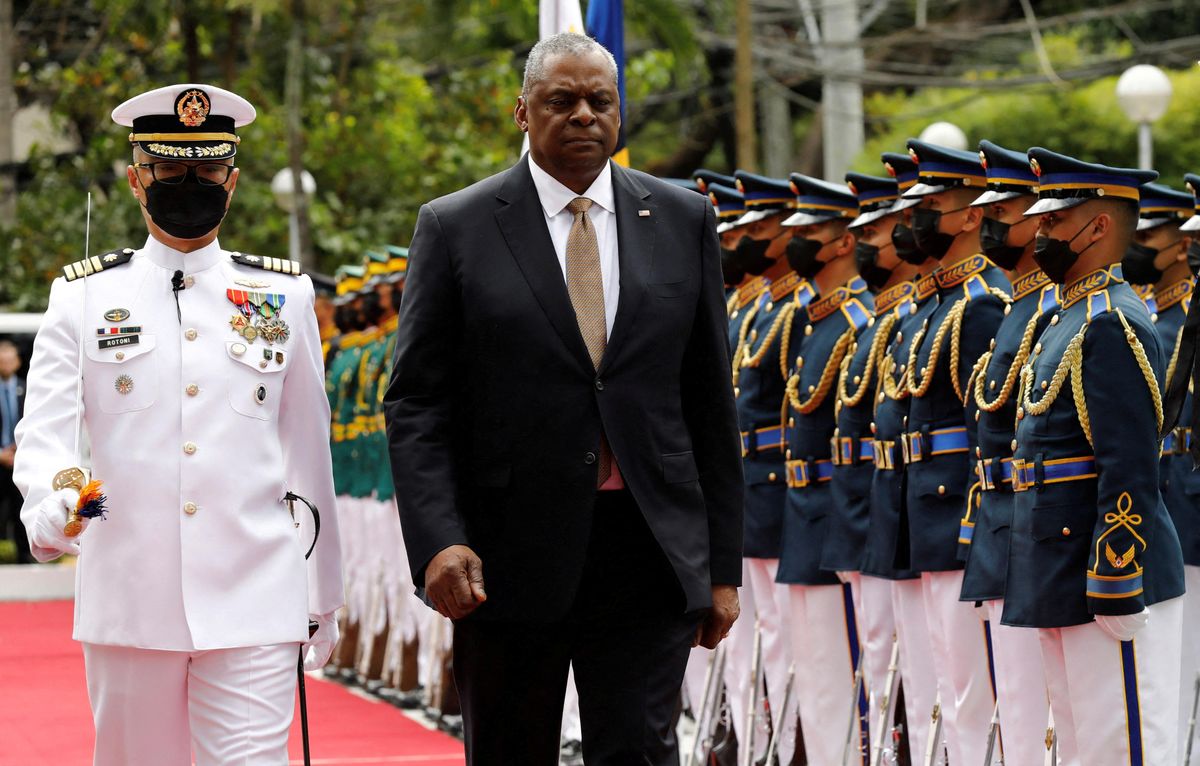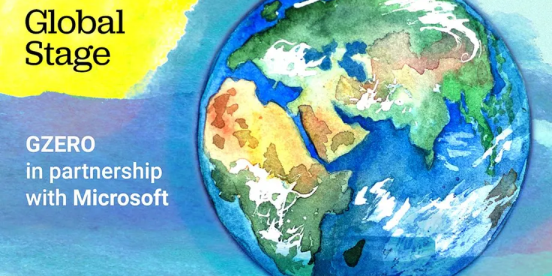We have updated our Privacy Policy and Terms of Use for Eurasia Group and its affiliates, including GZERO Media, to clarify the types of data we collect, how we collect it, how we use data and with whom we share data. By using our website you consent to our Terms and Conditions and Privacy Policy, including the transfer of your personal data to the United States from your country of residence, and our use of cookies described in our Cookie Policy.
What We're Watching: US military in the Philippines, Ecuadorian referendum, Israel's AG vs. Bibi, Ukraine shows EU anti-corruption love, China's snoop balloon

U.S. Defense Secretary Lloyd Austin III at the military camp in Quezon City, Metro Manila, Philippines.
Don't buy hype about the US military in the Philippines to counter China
The Philippine decision to grant the US military access to four more military bases in the country has gotten a lot of buzz that it’s a major move against China. For sure, the archipelago is the closest US ally to Taiwan and the disputed South China Sea – Beijing claims sovereignty over both. But while Xi Jinping is surely not happy about America getting additional places in Southeast Asia to host its troops, the move is no game changer in US efforts to better patrol the region or — yikes — respond to an eventual Chinese attack on Taiwan. Why? For one thing, the US military only really needs to use two old American bases north of Manila because they are both very big and close enough to the action. What’s more, the other sites are either too small or still under construction. There is, however, an interesting domestic political angle. President Ferdinand "Bongbong" Marcos Jr., aware that most Filipinos have soured on China over its actions in the South China Sea, wants to show his people that he won't be as chummy with Xi as his predecessor, Rodrigo Duterte. At the same time, Bongbong also knows that the Philippine economy is so dependent on trade with China and that his military is so weak that he can't afford to push Beijing too hard. If he's not forced to pick a side, he'll continue to play both — taking a page from his dictator dad’s old playbook.How to lasso drug cartels, Ecuador edition
Ecuadorian President Guillermo Lasso, a conservative and former businessman, says his government doesn’t have the tools it needs to tackle a rising tide of violence and narco-trafficking. So this Sunday, he’s asking voters to approve several constitutional amendments that would make that task easier, such as permitting the army to join police in drug raids and greenlighting the extradition of drug suspects to face trial in the US. Lasso is also proposing to shrink the size of Ecuador’s fractious Congress. Drug violence is definitely a problem — last year saw the highest number of homicides on record, and polls show most Ecuadorians are on board with the constitutional changes. But critics say that Lasso, who narrowly escaped impeachment during widespread Indigenous-led protests last year and whose approval ratings have fallen as low as 15%, is using the referendum to revive his political fortunes and punish Congress.
Israel’s attorney general claps back
Israel’s looming constitutional crisis deepened on Thursday when Attorney General Gali Baharav-Miara called on PM Benjamin “Bibi” Netanyahu to distance himself from involvement in the government’s proposed changes to the judiciary, citing a conflict of interest. Bibi’s far-right government is seeking to curtail the powers of the High Court – the same court in which he is a defendant in three ongoing corruption cases. Baharav-Miara also said the proposed judicial reforms, which would give the Knesset powers to override judicial rulings, would “severely harm” Israel's separation of powers. Meanwhile, Bibi, currently in Paris for a meeting with French President Emmanuel Macron, called the attorney general’s letter “unacceptable” and asked for two weeks to respond. Bibi, for his part, can’t afford to lose the battle over judicial reforms as it’s a key demand of his far-right and ultra-Orthodox coalition partners. Indeed, Baharav-Miara's findings will complicate the government's efforts to rush this bill through the Knesset. In the meantime, both sides will dig in their heels: For Bibi fans, it’s another indication the judiciary is out to get their man, but critics of the proposed changes say it’s proof that Bibi’s reforms are motivated by self-interest.
Ukraine rolls out the anti-corruption red carpet for EU leaders
Ukraine conducted a slew of anti-corruption raids hours before European Commission President Ursula von der Leyen touched down in Kyiv for an EU-Ukraine summit on Thursday. Authorities claim to have uncovered a plan by the state-owned oil company to embezzle $1 billion from the government. Prior to hosting the largest number of EU leaders since the Russian invasion, President Volodymyr Zelensky likely wants to send a clear message: We still want more weapons, and we will do whatever it takes (on graft) to join your club. Ukraine, which applied to become part of the bloc days after the war began and was given official candidate status last June, is far from being assured membership. Brussels has made clear that it will not admit a country at war, and that making serious financial and political reforms is a precondition for joining. Ukraine’s long history of graft and corruption predates the Russian invasion, but in recent weeks Zelensky has accelerated efforts to clean house by dismissing high-profile figures and by promising institutional reform. Zelensky was elected in 2019 on an anti-corruption agenda and has since made only modest progress on that score. Ukraine rose 3 points on Transparency International’s 2022 perceptions of corruption survey, a slight improvement, but it still placed below graft-prone Belarus, Malawi, and Indonesia.
It’s a bird, it’s a plane ...
... it’s a spy balloon belonging to Xi Jinping. Details are sketchy still, but the Pentagon said late Thursday it had spotted the balloon aloft over the Big Sky state of Montana. US officials decided not to shoot it down for fear that falling debris could hurt people on the ground. While the balloon doesn't seem to be much of a threat – China already has plenty of satellite-based surveillance anyway – the event prompted US Secretary of State Anthony Blinken to indefinitely postpone his first planned trip to Beijing, which was set for this weekend. This isn’t the first time that China has sent snoop balloons across the Pacific, officials say, but Washington’s decision to announce it at this precarious moment in US-China relations is sure to escalate tensions with Beijing: It comes just days after the US announced plans to beef up its military presence near China and ratcheted up the war over microchips.
